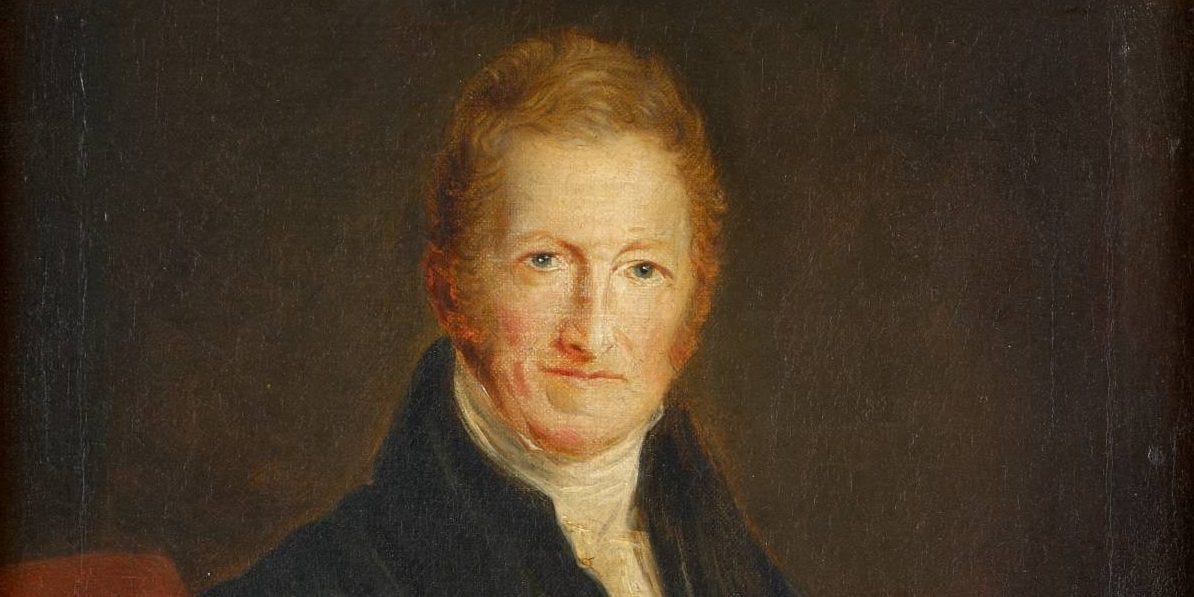Malthusian Malarkey
“Nature does not hurry, yet everything is accomplished.” – Lao Tzu
We often say that if nuclear energy were discovered today, it would be heralded as planet-saving technology to be invested in and propagated at warp speed. An intelligent global energy policy with nuclear power as a foundation can provide abundance to all humanity with minimal impact on the environment. Without hyperbole, there is no path to a decarbonized economy that avoids mass starvation and economic collapse without nuclear power, and the hardest opponents of the technology know it.
Foundational to the environmentalist anti-nuclear movement is an ugly strain of Malthusian pessimism born of eugenics, a fact that many would now like erased from history. Thomas Robert Malthus was an English economist who specialized in the fields of political economy and demography. In 1798, he published a rather unfortunate book called An Essay on the Principle of Population. In it, he argued population growth always outstrips our ability to supply the concurrent need for increased resources (especially food), resulting in inevitable cycles of overpopulation, rapid resource depletion, and extreme human suffering.
In essence, Malthus was a techno-pessimist who radically underestimated humanity’s potential for innovation. He contended it was better to prevent the overpopulation catastrophe proactively, calling for a combination of increased birth control and “permitting” higher mortality rates – a euphemism that could only have been penned from the comfort of a university office. Of course, once one decides the world has too many people, all manner of cruel solutions suddenly become justifiable, especially if the expendable ones live in a far-off land and don’t look like you. It takes no special knowledge of history to connect the dots from the Malthusian school of thought to some of the cruelest and most regrettable episodes of our collective past.
Alarmingly, environmentalist opposition to nuclear was, from the start, precisely because it makes cheap and clean energy abundance possible. In 1968, a book called Population Bomb was published. The book, authored by Paul Ehrlich, was written at the request of then-President of the Sierra Club, David Brower. In a later interview (surfaced by Emmet Penney, cited below), Ehrlich pointedly memorialized this position by stating: “In fact, giving society cheap abundant energy at this point would be the equivalent of giving an idiot child a machine gun.”
The mid-twentieth century represented a time in which concerns over overpopulation were very much in the Overton window. In his excellent recent essay published in American Affairs titled Who Killed Nuclear Energy and How to Revive It, Emmet Penney forces the reader to confront this uncomfortable reality (emphasis added throughout):
“The postwar American environmental movement began as an outgrowth from the eugenics movement. This has been largely forgotten, leading one historian to write, “Although one can hardly pick up an environmental book from the late 1960s and early 1970s that does not warn about overpopulation, it is surprisingly easy to find a history of the movement that barely mentions overpopulation. Eugenics took root in late nineteenth-century America with the formation of groups like the Immigration Restriction League and the Eugenics Records Office. Its boosters included historic figures like Theodore Roosevelt and lesser-knowns like Madison Grant, whose bestselling book The Passing of the Great Race was referred to by Hitler as his ‘Bible,’ and Henry Fairfield Osborn, then president of the Natural History Museum. Both Grant and Osborn connected poor breeding with environmental degradation.”



